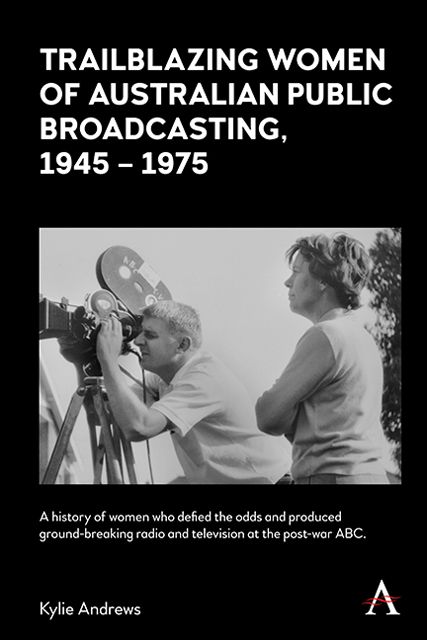Book contents
- Frontmatter
- Dedication
- Contents
- List of Figures
- List of Abbreviations
- Preface
- 1 Introduction
- 2 Career Snapshots
- 3 Welcome to the ABC, Ladies
- 4 The New Nation-Builders
- 5 Talent Was Not Enough
- 6 Thinking Outside the Box
- 7 Timely Escapes and Bittersweet Homecomings
- 8 International Adventures and Global Networking
- 9 Farewell to the ABC
- 10 Epilogue
- Reference List
- Index
- Frontmatter
- Dedication
- Contents
- List of Figures
- List of Abbreviations
- Preface
- 1 Introduction
- 2 Career Snapshots
- 3 Welcome to the ABC, Ladies
- 4 The New Nation-Builders
- 5 Talent Was Not Enough
- 6 Thinking Outside the Box
- 7 Timely Escapes and Bittersweet Homecomings
- 8 International Adventures and Global Networking
- 9 Farewell to the ABC
- 10 Epilogue
- Reference List
- Index
Summary
Kay Kinane
We wanted […] to say, look, the world's a wonderful place, c’mon!’ That's why we’d get psychology lecturers, we’d get people from university talking about career paths for women, we’d get anything at all that led to showing what we felt about the world, that it was worth all of us becoming and passing on, the things we’d found out about living. Because it was a wonderful place to be.
Tall and imposing with a calm, sonorous voice, Kay Kinane was unafraid to roll up her sleeves and leap into the middle of the action, whether directing live broadcasts, inspecting migrant camps in post-war Germany or riding a motorbike in the Outback. In 1944, she was recognized for her innovative approach to producing educational content and became the first woman to lead an ABC state department as a Supervisor of Schools Broadcasting. Four years later she was promoted again, this time to a national position as Federal Script Editor (Education). Kay Kinane produced hundreds of radio projects in the first phase of her broadcasting career, including numerous adult education programmes, radio for migrants and scores of educational shows for children, such as the celebrated narrative series, The Days of Good Queen Bess (1948) and the 12-part environmental history The World We Live In (1955). In 1956, after helping set up the ABC's television training school, Kay agreed to be the first showrunner of Woman's World where she and host Mary Rossi pushed the boundaries of what were determined to be ‘women's interests’ on television. Woman's World addressed a diverse range of issues; in one week the show might celebrate the wonders of the classical world, present comedy performances and give book reviews, and in another demonstrate basic carpentry for housewives, discuss the plight of single mothers and teach parents how to diagnose dyslexia.
Kay Kinane eventually returned to educational broadcasting and attained one female-first role after another. She played a key part in the formation of national educational broadcast policy and practice. She was promoted to Assistant Director of the national department in 1964, and was subsequently elevated to the rank of Federal Supervisor of Young People's Programmes in 1968.
- Type
- Chapter
- Information
- Publisher: Anthem PressPrint publication year: 2022

